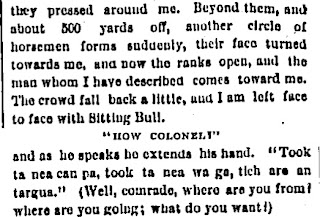
Well, all three parts of Episode #1000 are up -- I've never done anything quite like this. In fact, I doubt if anybody has ever done anything quite like this. Essentially, this is a three hour and ten minute long audio documentary, presented mostly with readings from period pieces of newspaper clippings and book excerpts.
Believe it or not, I left a lot of stuff out that I wanted to include to shave down the running time. Maybe I'll include that stuff in the book. Yeah, there's going to eventually be a book about Huntley, M. Quad, Fanny Fern, Doesticks, and lots of other great 19th Century humorists.
An example of something I left out was any mention of the Morey Letter, although I did infer something about it in the beginning of the first part. Essentially, while James Garfield was running for President in 1880, a newspaper called Truth published what they claimed was a letter from then Senator Garfield to a man named Morey, where he stated that he thought immigration policy should allow lots more Chinese workers into the country. Today, that would be like a Presidential candidate saying there aren't enough Mexican immigrants in the USA.
The more things change, the more they stay the same...
Anyway, the weird thing about all this is that Garfield told the press that that he didn't remember writing the letter, but that he might have! It took teams of Republican Party political operatives and spin doctors to pull Garfield's fat out of the fire. They printed up hundreds of thousands of flyers showing the Morey Letter on the left, and an example of Garfield's handwriting on the right, and distributed them all over the nation. Garfield won the election, but didn't serve too long, as he got shot not long afterward. The odd thing here is that Garfield admitted publicly that he possibly could have written the letter, which meant that maybe he did not disagree with it!
An investigation followed, and some detectives told reporters that they believed that Stanley Huntley, a staunch Democrat, in cahoots with Stilson Hutchins, owner of the Washington Post, created the letters as an elaborate election hoax. Huntley denied this vehemently, going as far as to write a special article for the Chicago Tribune pinning the blame on a noted forger named Phillip. But at the height of the Morey investigation hysteria, one week before the 1880 election, he inserted a Spoopendyke story called "Not Altogether Satisfactory" into the Brooklyn Eagle, where Mr. and Mrs. Spoopendyke argue over whether the Morey Letters were real or a hoax. Whether Huntley wrote the letters or not, here he was thumbing his nose at everyone over them.
So, I had all this stuff printed out and was going to read it into the third part of Episode #1000, but simply didn't have enough room for it. I probably will include in in a Basement Sunday Salad Episode real soon.
Meanwhile, while listening to these episodes in my car, I encountered some other glitches and typos. In the first Part, I called Eugene Field Stanley Field by mistake once. Sorry.
I also apparently lost control of the volume in several portions of Part One as well. Really sorry!
In Part Two, I discovered a major error, but a little detective work revealed the source of it. This is fascinating -- When Sitting Bull first confronts Stanley Huntley, he is quoted as greeting him with "How Colonel."
The odd thing I noticed while listening to this is that Huntley was alone. He was not a military man, wore no uniform, and Sitting Bull had no reason to call him "Colonel." But the oddest thing was that the 1879 Chicago Tribune had that line in bold type no less!
So how did this happen? Well, Huntley telegraphed the story from the wilderness to the Tribune. The newspaper made a big deal out of the fact that they spent over a thousand dollars for the telegraph costs alone. Now the article is full of instances of Indians saying to Huntley (and vice-versa) the traditional greeting of "How Cola." No doubt the telegraph operator may have thought the "a" in cola was a period, and the typesetter at the Tribune thought it was "Col." the abbreviation for Colonel, and spelled it out. So there. I caught it. Not that anyone is left alive from 1879 to say, "thanks for catching that, Mister Ron."

No comments:
Post a Comment